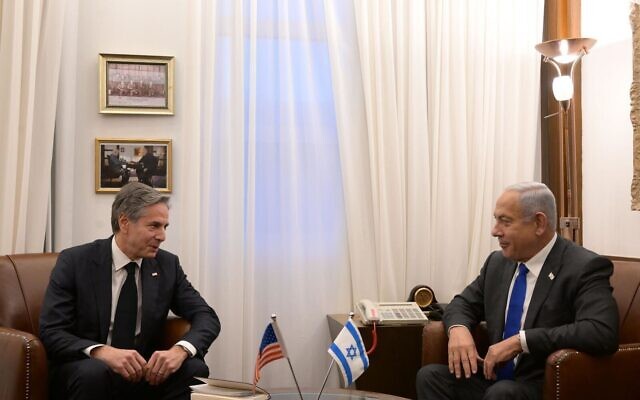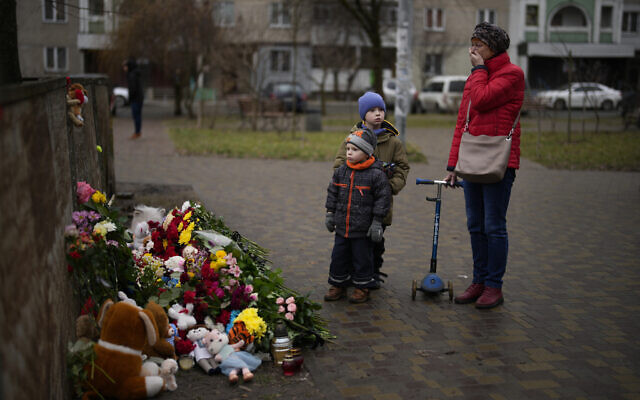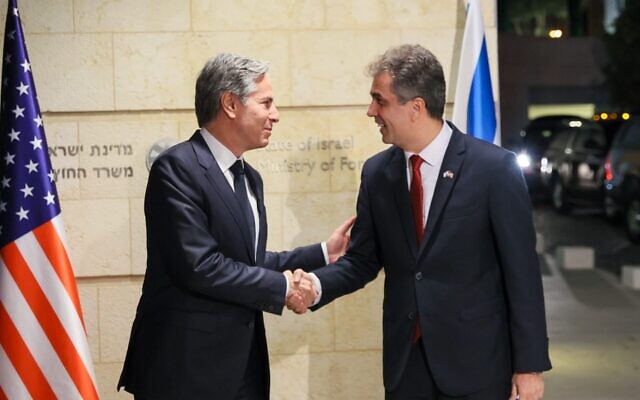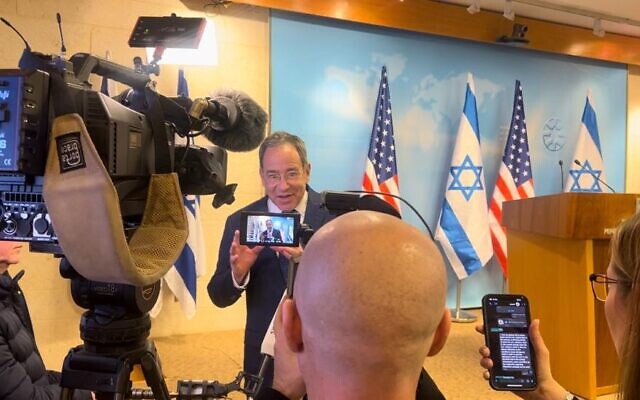Speaking alongside Prime Minister Benjamin Netanyahu — who sought to focus on Iran — US Secretary of State Antony Blinken placed a noticeable emphasis on the democratic values shared by the two countries, a clear sign that the White House is concerned over initiatives by Israel’s new right-wing government.
“Throughout the relationship between our countries, what we come back to time and again is that it is rooted both in shared interests and in shared values,” said Blinken.
“That includes our support for core democratic principles and institutions, including respect for human rights, the equal administration of justice for all, the equal rights of minority groups, the rule of law, free press, a robust civil society – and the vibrancy of Israel’s civil society has been on full display of late.”
The Netanyahu coalition is pushing a series of dramatic reforms that would increase government control over the judiciary. The plan has drawn intense criticism and warnings from leading financial and legal experts, as well as weekly mass protests and public petitions by various officials, professionals, and private companies.
“The commitment of people in both our countries to make their voices heard, to defend their rights, is one of the unique strengths of our democracies,” Blinken continued. “Another is a recognition that building consensus for new proposals is the most effective way to ensure they’re embraced and that they endure.”
Hinting at the deep disagreement between the Biden administration and Netanyahu’s government, Blinken said that the US and Israel have over the years strengthened their democracies by “holding ourselves to the mutual standards we’ve established; and by speaking frankly and respectfully, as friends do, when we agree and when we do not.”

Israelis protest against the planned judicial overhaul, in Tel Aviv, January 21, 2023. (Tomer Neuberg/Flash90)
In a later meeting, President Isaac Herzog told Blinken that he is “heavily devoted” to resolving the issue of the judicial overhaul or at least helping the sides debate the issue civilly.
“This is an issue that requires wide consensus, and it is an issue many democracies debate. We are a vibrant democracy,” Herzog said.
Speaking before Blinken, Netanyahu stressed that Israel and the US “share common values; two strong democracies which will remain, I assure you, two strong democracies.”
But Netanyahu focused the conversation on Tehran, telling Blinken that the international community had seen “the true face of Iran.”
“They’ve seen the barbarism of this regime against its own people,” said Netanyahu, referring to the months-long protests in Iran. “They’ve seen how it exports aggression beyond its border and beyond the Middle East, and I think there is a common consensus that this regime must not acquire nuclear weapons.”
“Our policy, and my policy, is to do everything within Israel’s power to prevent Iran from acquiring nuclear weapons and the means to deliver them,” Netanyahu continued.

Prime Minister Benjamin Netanyahu (right) meets with US Secretary of State Antony Blinken, in Jerusalem on January 30, 2023. (Amos Ben Gershom/GPO)
Blinken also spoke about stopping Iran from acquiring a nuclear weapon, but moved quickly to the drones Iran is providing to Moscow.
He also obliquely urged Israel to expand its support for Kyiv, saying that “Russia’s ongoing atrocities only underscore the importance of providing support for all of Ukraine’s needs – humanitarian, economic, and security.”
Israel has sought to maintain a neutral stance on the war, keeping channels open with both Russia and Ukraine. Israel refused to arm Kyiv over fears of angering Moscow, concerned that doing so would jeopardize its decade-long campaign in Syria to prevent the entrenchment of Iran on its northern border. Russia, which has advanced air defenses in Syria, largely refrained from interfering with Israeli airstrikes.

People pay their respects at a makeshift memorial at the scene where a helicopter crashed into civil infrastructure on January 18, in Brovary, on the outskirts of Kyiv, Ukraine, January 20, 2023. (Daniel Cole/AP)
Both men spoke about Israeli-Palestinian relations. After expounding on the importance of helping Israel integrate into the region and expand the Abraham Accords, Blinken emphasized that “these efforts are not a substitute for progress between Israelis and Palestinians.”
“We continue to believe that the best way to achieve it is through preserving and then realizing the vision of two states,” said Blinken, adding that the US is “urging all sides now to take urgent steps to restore calm, to de-escalate.”
Though he often avoids speaking about the Palestinian in public statements alongside visiting officials, Netanyahu said that expanding the circle of peace “would also help us achieve a workable solution with our Palestinian neighbors.”
He did not mention a two-state solution.
Kyiv bound
Blinken met in the evening with Foreign Minister Eli Cohen, who proudly mentioned his upcoming visit to Kyiv.
Cohen will be the most senior Israeli official, and first Middle Eastern foreign minister, to visit Ukraine during the war.

Foreign Minister Eli Cohen (right) and US Secretary of State Antony Blinken hold a press conference at the Foreign Ministry in Jerusalem, January 30, 2023. (Miriam Shimonovich/Foreign Minstry)
According to the Foreign Ministry, Cohen asked Blinken for assistance in expanding the Abraham Accords, and in helping convince Oman to open its skies to Israeli flights.
They also spoke about the effect of the Abraham Accords on Israel’s ties with Egypt and Jordan. Israel has had diplomatic relations with both neighbors for decades, but the peace remains cold and focused on security coordination. Egypt has participated in the Negev Forum gatherings, but Jordan continues to stay away.
In his statements after their meeting, Blinken hit many of the same notes he did in his statement alongside Cohen that he did with Netanyahu, saying the US-Israel relationship is “grounded in a long history of shared democratic values.”
He also emphasized reducing the ongoing “cycle of violence,” saying that it is “incumbent on all parties to de-escalate tensions.”
The US secretary of state gently critiqued Israel’s position on the Russia-Ukraine war once again. “We appreciate Israel’s humanitarian assistance,” said Blinken, adding that “we look forward to discussing what more can we do.”
Cohen highlighted Israel’s aid to Ukraine, noting that the US embassy in Kyiv will return to full activity soon. Cohen also confirmed The Times of Israel report that he would visit Kyiv “in the near future.”

US Ambassador to Israel Tom Nides speak to the press about the Visa Waiver Program in Jerusalem, January 30, 2023. (Lazar Berman/The Times of Israel)
Cohen vowed to “take all necessary measures, including legislation” to fulfill the requirements for Israel to join the US Visa Waiver Program.
Diplomatic sources told The Times of Israel that US Ambassador Tom Nides was concerned about overly optimistic messages from the Foreign Ministry that implied the Visa Waiver Process was a done deal for Israel.
While it managed to get below the three-percent visa rejection rate, it still must pass a series of laws and establish systems to share information. Nides released a video and gave interviews on Monday stressing that there is still some ways to go, and that Israel must act quickly.
Blinken is scheduled to travel to Ramallah on Tuesday, days after a Palestinian gunman on Friday killed seven people outside a synagogue in the Jerusalem neighborhood of Neve Yaakov, and another attack the next day that seriously injured two.
Blinken strongly condemned the attacks in every statement he made on the trip.
World - Latest - Google News
January 31, 2023 at 06:48AM
https://ift.tt/7UtInEu
As Netanyahu talks Iran, Blinken makes US concerns over judicial shakeup clear - The Times of Israel
World - Latest - Google News
https://ift.tt/MVuEmfN
Bagikan Berita Ini














0 Response to "As Netanyahu talks Iran, Blinken makes US concerns over judicial shakeup clear - The Times of Israel"
Post a Comment